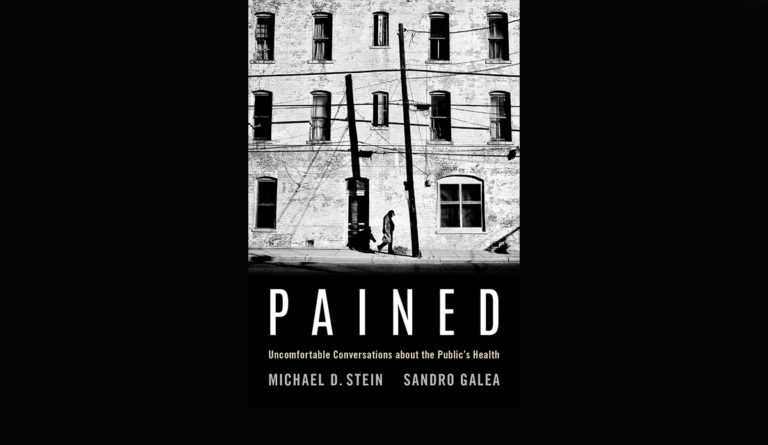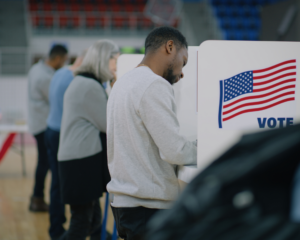Michael Stein and Sandro Galea Discuss PAINED
Michael Stein and Sandro Galea discuss PAINED, a collection of 50 short essays and 20 databytes that stimulate the national conversation about health.

Read Time: 8 minutes
Published:
Michael Stein is the chair of health law, policy, and management at Boston University School of Public Health and the executive editor of Public Health Post. Sandro Galea is the Dean and Robert A. Knox professor at Boston University School of Public Health. Stein and Galea discuss their recently published book, Pained: Uncomfortable Conversations about the Public’s Health. Pained emerged as a series of perspective pieces published in Public Health Post under the label “The Public’s Health.” Their new book collects 50 short essays and 20 databytes to stimulate the national conversation about health.
Public Health Post: What was the spark that lit the fire under you to pursue your work in public health?
Sandro Galea: I trained as a doctor originally. My interest in public health came very much from clinical medicine. I think I really came to it with clarity when I was working in Somalia and dealing with people who were acutely ill on a day-to-day basis. I realized that my dealing with them was not really changing very much. Because once I left, the people would still get sick. I became very interested in understanding how to keep people from getting sick. That’s when I drifted to public health. I did my training in public health. I’ve been in public health ever since.
Michael Stein: When I was a medical student training in New York City, we began to see the first patients with these odd and devastating infections coming into the hospital. It was, of course, the beginning of the HIV epidemic, although we didn’t know what the cause was at that point. And the underlying disease had no name yet, but we were scared. Soon enough, it was clear to me that this new form of immunosuppression was going to stay around for a while, and that it was an illness that was going to be related to sex and drugs. That it was going to affect my generation. I was a young person at that point. I was hooked and moved onto running an HIV program and investigating related social issues ever since.
What is uncomfortable about the conversations that we have in public health, and how can we make these uncomfortable conversations comfortable?
Michael Stein: I would say following up on the last response, we’re in the midst of yet another: the current epidemic right now of coronavirus, which is the third epidemic in my career after the HIV and opioid problems. Each one of these, it seems to me, opens up topics that, if we address them honestly, have to make us uncomfortable and should make us uncomfortable because all of these epidemics bring up questions about money, inequality, power, and death. To use medical language, public health is about how we stay well and what’s wrong with us. Public health also just asks exhausting questions like, “What do we value?” What’s dangerous in the world? These questions are uncomfortable ones. I think that conversations should be uncomfortable, and we should be comfortable with that discomfort.
Sandro Galea: I think I echo Dr. Stein. I’m not sure they should be comfortable. I think, ultimately, when you think about the health of populations, you inevitably end up thinking that you need to create the conditions that generate health. Creating those conditions require tackling the structural forces that create health and create poor health. That means dealing with unstable housing and with inadequate incomes, with gender inequities, with the pollution of air and water, with economies that are not fair, with racism, and with segregation. These are difficult topics. These fundamental causes exist because of the way we have structured societies over a long time. There are many vested interests in maintaining the status quo. That is true, always. So, saying that we want to tackle these forces means creating discomfort. I think the very business of generating better health in populations with a lens on the health equity is inextricably bound with discomfort.
In the preface of Pained, you reflect on Benjamin Franklin’s Junto Club as a forum for a select group of his friends and neighbors to address the issues of the day. How is Pained like the Junto Club?
Sandro Galea: It was a device, really, to say that we are interested in engaging difficult, challenging conversations–difficult topics to illuminate a way forward. I think it reflects a commitment to unsparingly tackle topics that we frequently do not put on the table. I think we had envisioned Pained in this initial conception almost like a set of dinner table conversation starters, and which is why each chapter is so short. It was intended to say, “Take a chapter, read the chapter, and discuss it with people you trust, with colleagues, or with people you don’t know as well.” If we all did that, it would take us to a better place in our collective understanding of how to improve the health of populations.
Michael Stein: I see it as Dr. Galea sees it. This book has about 50 or 60 essays. Each one is meant to give just enough information or sometimes just pointed enough an opinion to provoke a conversation. We chose our topics to pick up complicated issues that we think were worth discussing, if not arguing over, in small and large groups.
For me, public health is and will continue to be, incredibly important work because it concerns, at every turn, our responsibility to other people.
Your book was written before Covid-19. How has the pandemic we are living through now affected the conversations that we have about public health?
Michael Stein: It has been said that disasters are the great equalizer. I think that’s true about floods, fires, and disasters that affect people randomly. It was true, really, at the start of this epidemic. This pandemic, as well, I think. But to me, once disasters strike, the results are not random. With Covid-19, we see that because this is a pandemic that reveals inequalities about who can protect themselves. Who gets sick? There are populations that we know are vulnerable: the homeless, the disabled, the incarcerated, the poor. These groups are even more vulnerable at the moment. After the onslaught of death, what Covid-19 should be doing is bringing new vigor to those conversations of public health, about how to temper the effects of inequality. They should raise in us an awareness of wanting and seeking a more just society. One that provides people with those things we know are necessary: food, shelter, health care, education, et cetera.
Sandro Galea: I’ve been asked several times in the past few days whether there is a silver lining. It’s very hard to say there’s a silver lining in the middle of a pandemic, but perhaps there is, and perhaps it is changing how we talk about health. I agree with Dr. Stein that this is the third pandemic over our lifetimes: HIV, the opioid epidemic, and now coronavirus. I actually think I would put in there, in terms of the third wave of shocks to the American national conversation, HIV, the onset of terrorism, and domestic shores after 9/11, and now this. I think these events do change the national conversation. Now the question, I think, is, “It changed the conversation in which direction?” How is the conversation going to improve? How is it going to get better? I think it will get better, if we now start talking about the forces that really generate health. That would be a true silver lining. Will we get there? I don’t know, but the fact that we’re having this conversation suggests to me that we’re heading in the right direction.
I would love it, if we can emerge from this period. By the grace of God, we shall emerge in having conversations about the foundations that shape health. Having conversations publicly about the gaps between health haves and health have nots–having conversations publicly about the fact that there can be no health without paying attention to the underlying social and economic justice concerns that shape health in populations. And in some respects, the book was written, as you noted, long before coronavirus was a glimmer in our eye. But, as I go back and read parts of it now, it is perhaps more appropriate than ever.
What advice would you offer to the next generation of public health practitioners who will go on to change the way we communicate about health?
Michael Stein: For me, public health is and will continue to be, incredibly important work because it concerns, at every turn, our responsibility to other people. I can think of few kinds of work that offer such meaning to our lives. The job of those who do public health work is to care for the public, which is a beautiful and positive counterpoint to caring primarily about what individuals want, which too often is the point of view that dominates our conversations.
Sandro Galea: I suppose I would love to see the next generation never lose sight of the foundational conditions that create health. To realize that there can be no health for one, if there is not health for all. To keep in front of their minds that the health of populations is bound to the conditions around which we live. To realize that compassion has to be at the heart of health, and to recognize that a world that doesn’t elevate respect, justice, and building a sustainable ecosystem is never going to be a healthy world. I think, if we have a generation of public health professionals, scholars, doers, thinkers who see that, it will lead us to a much better place.
Photo by Matt Black



